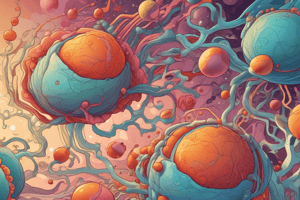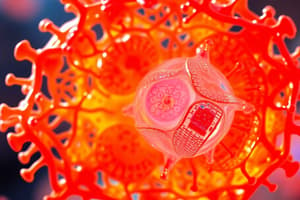Podcast
Questions and Answers
Which hormones play crucial roles in regulating the kidneys?
Which hormones play crucial roles in regulating the kidneys?
Antidiuretic hormone (ADH), aldosterone, and angiotensin II
What are the components of the urinary system?
What are the components of the urinary system?
Kidneys, ureters, bladder, and urethra
Study Notes
Biology: Exploring Biochemistry and the Urinary System
In this article, we delve into the fascinating world of biology, focusing on two subtopics: biochemistry and the urinary/renal system. Biology encompasses the study of living organisms and their interactions with the environment, including the molecular processes that underpin life.
1. Biochemistry: The Chemistry of Life
Biochemistry is the study of the chemical processes that occur within living organisms. It investigates the interactions between molecules that govern life, such as proteins, carbohydrates, lipids, and nucleic acids.
-
Molecular Structure and Function
- Proteins play a critical role in maintaining structure, catalyzing biochemical reactions, and acting as signaling molecules.
-
Metabolism and Energy
- Cellular respiration is the process of generating energy from nutrients, while photosynthesis is the process by which plants convert sunlight into energy.
-
Enzymes and Catalysis
- Enzymes are biological catalysts that speed up biochemical reactions in cells, allowing organisms to maintain a rapid metabolic rate.
-
Genetic Information and DNA
- Deoxyribonucleic Acid (DNA) is the genetic blueprint that contains instructions for building and maintaining an organism.
2. Urinary System: The Kidneys and Excretion
The urinary system is a complex biological system that removes waste products, excess water, and electrolytes from the body. A key component of this system is the kidneys, which are responsible for filtering blood and producing urine.
-
Function of the Kidneys
- The kidneys filter blood, removing waste products and excess water, while producing urine. This process also helps regulate electrolyte balance, blood pressure, and pH.
-
Renal Filtration
- The glomerulus is a network of capillaries that filters blood, allowing water, ions, and small molecules to pass through while retaining larger molecules and blood cells.
-
Tubular Reabsorption and Secretion
- The tubules of the kidneys reabsorb essential nutrients, water, and electrolytes while secreting waste products, excess ions, and certain drugs.
-
Hormones and Regulation
- Hormones like antidiuretic hormone (ADH), aldosterone, and angiotensin II play crucial roles in regulating the kidneys and maintaining water, electrolyte, and blood pressure balance.
-
Urinary System Components
- The urinary system includes the kidneys, ureters, bladder, and urethra. The kidneys filter blood and produce urine, while the ureters transport urine to the bladder, which stores and releases it through the urethra.
Concluding Remarks
Biochemistry and the urinary/renal system are two fascinating subtopics within the broader field of biology. Understanding these processes allows us to appreciate the intricate nature of life and the mechanisms that govern our bodies. As scientists continue to study these topics, our understanding of living organisms grows and advances our ability to treat and prevent diseases.
Remember, however, that this article does not include citations or references to primary sources. If you're interested in exploring this information further, please consult the sources listed in the "Related Links" section at the beginning of this article.
Studying That Suits You
Use AI to generate personalized quizzes and flashcards to suit your learning preferences.
Description
Explore the intricate world of biology, focusing on biochemistry and the urinary/renal system. Delve into the chemical processes of life, molecular structures, kidney functions, and hormonal regulations within living organisms.




